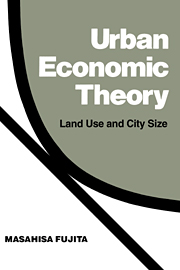8 - External economies, product variety, and city sizes
Published online by Cambridge University Press: 23 December 2009
Summary
Introduction
In Section 5.2, we discussed various causes of city formation. In this chapter, we examine in more depth the roles of external economies and product variety in city formation.
In the literature of location theory and urban economics, production scale economies are often classified into two types: economies of scale within a firm, and (Marshallian) external economies which are external to individual firms but internal to the industry. In our earlier discussion (Section 5.7), this distinction of production scale economies was unnecessary because the developer or city government was assumed to control the entire production activity and hence to internalize all externalities. Indeed, in the case of economies of scale within a firm, it is natural to assume that each firm will behave as the developer of its own city and control all aspects of city formation. This model of a factory town or company town, however, cannot explain the formation of a city with more than one major firm and hence rarely corresponds to the nature of modern cities.
The concept of external economies, in contrast, provides a convenient framework within which to explain scale economies, due to spatial agglomeration of firms and population, and hence it has been widely used in the literature. This is because these economies are supposed to be external to individual firms, and thus increasing returns to scale become compatible with perfectly competitive equilibrium (as will be explained in Section 8.2).
- Type
- Chapter
- Information
- Urban Economic TheoryLand Use and City Size, pp. 271 - 306Publisher: Cambridge University PressPrint publication year: 1989



